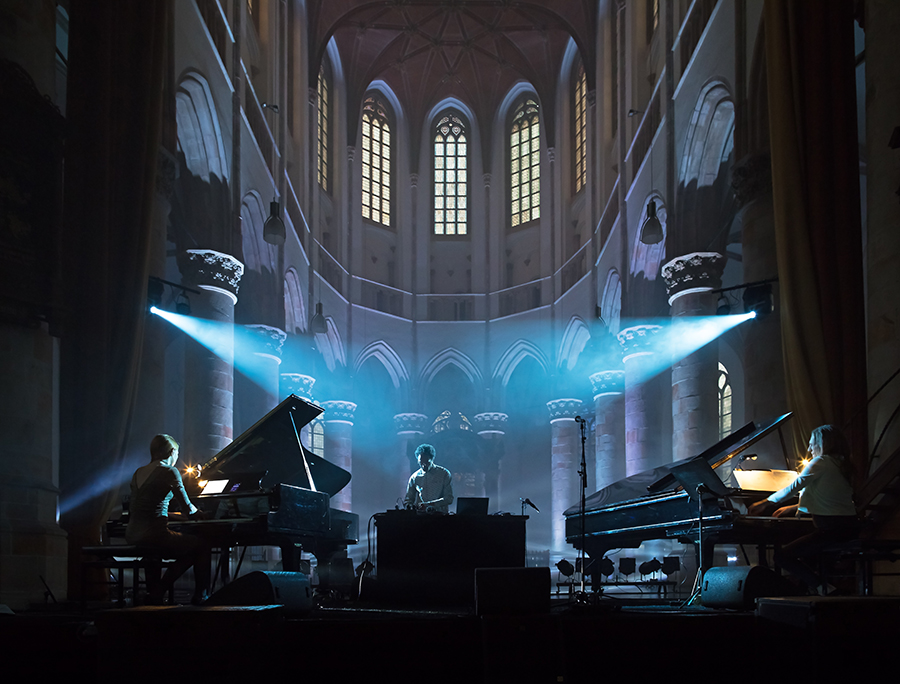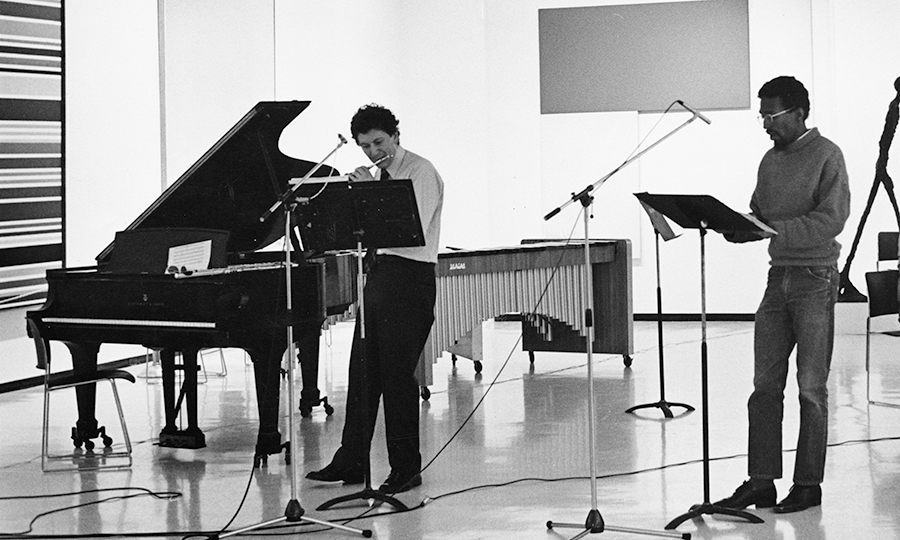The Julius Eastman Memorial Dinner
'Romantic, muscular, propulsive': Jace Clayton discusses his tribute to the American minimalist, ahead of its London performance this weekend
'Romantic, muscular, propulsive': Jace Clayton discusses his tribute to the American minimalist, ahead of its London performance this weekend

A little miracle took place during Jace Clayton’s performance at this year’s Rewire Festival. The artist formerly known as DJ/rupture had brought his Julius Eastman Memorial Dinner (2013-), a tribute to the American minimalist who died in 1990, to The Hague for its European premiere. For over an hour, Clayton, standing magisterial behind his laptop, processed live the playing of two pianists, hammering through Eastman’s controversially-named late works Gay Guerilla (1980) and Evil Nigger (1979). The venue was the city’s 15th century Grote Kerk, whose 93-metre-tall, six-sided tower looms over the central Oude Stad.
Roughly 40 minutes into the set, as Clayton’s digital manipulations brought the piano playing of David Friend and Saskia Lankhoorn to a tremulous exaltation, the dry ice behind the performers suddenly cleared, the lights changed colour, and for a brief moment the church’s marble altarpiece was bathed in a preternatural yellow glow, as though smiled upon by unearthly forces. It was a stunning – and quite unintentional – coup de théâtre, oddly appropriate for a concert dedicated to a composer in whom the ecstatic and the aleatoric often mingled in one of the most dramatic biographies in 20th century music.

Born in Harlem Hospital, Manhattan, in October 1940, Eastman’s family moved upstate during his early childhood, first to Syracuse, later Ithaca. He started singing opera professionally while still in elementary school (in a production of Humperdinck’s 1893 work Hansel and Gretel) and by his 30th birthday was receiving national recognition (and shortly after, a Grammy nomination) for his performance in Peter Maxwell Davies’s vocal tour-de-force Eight Songs for a Mad King (1969). But his part in a performance of John Cage’s Song Books (1970) at the June in Buffalo festival of 1975, culminating in Eastman stripping a man naked onstage and – according to some reports – caressing him sexually, brought the ire of its composer, who publicly accused Eastman of ‘trampling’ on his work and behaving ‘irresponsibly.’
Meanwhile, Eastman’s own music was growing in reputation, performed at the Kitchen in New York and on tour throughout Europe, commissioned by Lukas Foss for the Brooklyn Philharmonia, by the Albany Composers’ Forum, and by the dancer Karl Singletary. But if the name was unfamiliar to Jace Clayton when first introduced to Eastman’s music just six years ago, we shouldn’t be surprised. By the early 1980s, the composer was becoming notorious for his irascible and unpredictable nature, was often seen drinking in the early hours of the day, and was rumoured to be using drugs.

For several years he lived without fixed address, his possessions – including scores and recordings of his own music – confiscated when he failed to pay the rent, and he would often find himself sleeping in homeless shelters or amongst the drifters and drug dealers in a squatters’ encampment in Tompkins Square Park in Manhattan’s East Village. When Eastman died in 1990, of a cardiac arrest presumed to be brought on by some combination of exhaustion and malnutrition, no public notice was made of his passing for close to a year, so far had he fallen from the grace of America’s new music scene. His legacy was presumed lost, thought to have perished with its creator.
Fast-forward to 2011: Jace Clayton, already famous for genre-spanning DJ mixes in which Luciano Berio rubs up against Greensleeves reggae riddims, is invited to produce a work for an evening of live radio plays for New York’s Performa Biennial. ‘What’s the space like?’ Clayton asked. ‘They described it to me, and there was a piano in the corner,’ he recalls. ‘That sparked all these thoughts. This was the perfect opportunity to really explore the sounds of the piano.’

When Clayton found himself on the lookout for piano repertoire, it was his friend, Sharifa Rhodes-Pitts, who supplied the answer. Her book on the neighbourhood of Eastman’s birth, Harlem is Nowhere: A Journey to the Mecca of Black America (2011), had been recently published and it was to Eastman that she suggested he look. ‘And then I was completely blown away,’ Clayton recalls. In the two piano pieces that would ultimately make up the bulk of his performance, Clayton found something ‘romantic, muscular, propulsive, with this great organic shape.’
But The Julius Eastman Memorial Dinner, as the project became known, was always more than just a recital with a little digital fiddling. Performa were curating an evening of radio plays. Clayton’s contribution would be no exception. At the Grote Kerk in The Hague, the two Eastman pieces were punctuated by the appearance from the wings of vocalist Anat Spiegel. We hear a telephone ring. From the ensuing conversation we learn that Clayton has tendered his application for a job: Julius Eastman impersonator to the Julius Eastman Memorial Dinner.

‘When I decided that I’m going to turn this into an evening-long performance piece,’ Clayton explains, ‘I started thinking, clearly I don’t just want to re-present his music. But I am excited by the possibility of engaging with this idea of how artists enter into the historical record.’ Clayton started to imagine a ‘near future’ scenario in which Eastman’s music has already been ‘thoroughly commodified’ and now exists as ‘a sort of schmaltzy dinner theatre’ to which the contemporary artist ‘Jace Clayton’ (in this scenario, he’s playing a kind of fictionalised version of himself) is forced to offer his services. ‘So much of Eastman’s biography is really dramatic: Addiction! Decline! All this. But it’s also incredibly common. Most musicians fail at some level. So then I was like, what does the contemporary precarity of the artist look like? It’s less about drugs and Tompkins Square Park and more about branding offers and having to work in a temp agency.’
Since Clayton first presented his Julius Eastman Memorial Dinner some four years ago, a little hint of his vision of the future has started to come true. In 2014, the Polish label, Bôrt, released a CD of pianists Bartek Wąsik and Emilia Sitarz playing Gay Guerilla and Evil Nigger. In the same year, New World Records put out Eastman’s Piano 2 (1986) (alongside works by Michael Byron, Stuart Saunders Smith, and ‘Blue’ Gene Tyranny), and in 2016, Frozen Reeds unearthed an archive recording of Eastman’s S.E.M. Ensemble playing his Femenine (1974). Mary Jane Leach and Renée Levine Packer published their collection of Eastman essays, Gay Guerilla, in 2015 and since then there have been programmes dedicated to his music in Philadelphia, Los Angeles, and London. All of a sudden, this once-marginalized composer is everywhere – and Clayton is finding that his piece, which effectively satirised these developments in advance – is getting eager bookings the world over. Outside New York, the Julius Eastman Memorial Dinner couldn’t get arrested in 2013. Now, Clayton is following its premiere at Rewire with shows at Austria’s Donau Festival, a European tour in the Autumn, and a major performance at London’s LSO St Luke’s this weekend.

‘The funny thing there is,’ Clayton laughs, ‘even from the beginning, I knew it was important to preserve the restlessness of this work. To ask, how can you honour the abrasiveness of someone who had a very interestingly conflicted relationship with his own historical record? I think the important thing is to keep looking further towards the edges. If you’re programming Eastman because the biography is so exciting, then name another black gay composer who’s alive that you enjoy. I think a lot of those programmers would have difficulty even doing that.’
Main image: Jace Clayton, Julius Eastman Memorial Dinner, 2013-, performance view at Rewire Festival, The Hague, 2017. Courtesy: Jace Clayton and Rewire Festival
The Julius Eastman Memorial Dinner, with DJ/Rupture, David Friend and Emily Manzo, and Arooj Aftab has its UK debut at LSO St Luke’s, 9 September 2017, 20:00





















